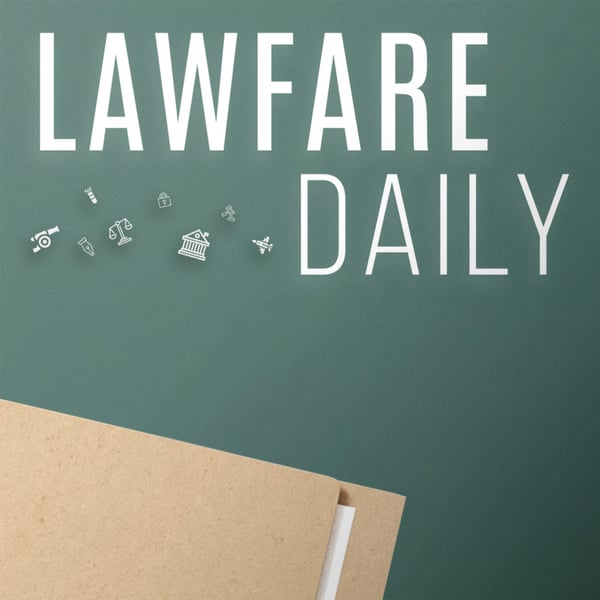Lawfare Archive: Waxman and Ramsey on Delegating War Power
The Lawfare Podcast
The Lawfare Institute
4.7 • 6.2K Ratings
🗓️ 9 November 2025
⏱️ 52 minutes
🧾️ Download transcript
Summary
There is much debate among academics and policy experts over the power the Constitution affords to the president and Congress to initiate military conflicts. But as Michael Ramsey and Matthew Waxman, law professors at the University of San Diego and Columbia, respectively, point out in a recent law review article, this focus misses the mark. In fact, the most salient constitutional war powers question—in our current era dominated by authorizations for the use of military force—is not whether the president has the unilateral authority to start large-scale conflicts. Rather, it is the scope of Congress’s authority to delegate its war-initiation power to the president. This question is particularly timely as the Supreme Court appears growingly skeptical of significant delegations of congressional power to the executive branch.
Matt Gluck, Research Fellow at Lawfare, spoke with Waxman and Ramsey about their article. They discussed the authors' findings about the history of war power delegations from the Founding era to the present, what these findings might mean if Congress takes a more assertive role in the war powers context, and why these constitutional questions matter if courts are likely to be hesitant to rule on war powers delegation questions.
To receive ad-free podcasts, become a Lawfare Material Supporter at www.patreon.com/lawfare. You can also support Lawfare by making a one-time donation at https://givebutter.com/lawfare-institute.
Support this show http://supporter.acast.com/lawfare.
Hosted on Acast. See acast.com/privacy for more information.
Transcript
Click on a timestamp to play from that location
| 0:00.0 | I'm Isabella Royale, with an episode from the Lawfare for November 9th, 2025. |
| 0:16.3 | As of November 5th, the U.S. military has carried out a series of strikes on alleged drug vessels |
| 0:20.9 | in the Caribbean and the Pacific, killing 67 individuals whom the administration alleges |
| 0:25.5 | were gang members trafficking narcotics to the United States. The Trump administration |
| 0:29.7 | has informed Congress that the U.S. is now engaged in a, quote, armed conflict, and |
| 0:34.5 | quote, against drug cartels, and that those killed in the strikes were, quote, |
| 0:38.6 | unlawful combatants, and quote. The strikes have triggered intense discussions of the scope of |
| 0:43.2 | presidential war powers. For today's archive, I chose an episode from January 22nd, 2004, |
| 0:48.3 | in which Matt Gluck, Matthew Waxman, and Michael Ramsey discussed the scope of Congress's |
| 0:52.9 | authority to delegate its war initiation power to the President, the evolution of war power delegation as a regular practice, the extent to which war powers may be uniquely delegable versus uniquely non-delegable, and more. |
| 1:05.0 | And more. I'm Matt Gluck, Research Fellow at Lawfare, and this is the Lawfare podcast, January 22, 2024. |
| 1:24.7 | There is much debate among academics and policy experts over the power the Constitution |
| 1:30.3 | affords to the President and Congress to initiate military conflicts. |
| 1:35.5 | But as Michael Ramsey and Matthew Waxman, law professors at the University of San Diego and |
| 1:40.9 | Columbia, respectively, point out in a recent law review article, this focus |
| 1:46.0 | misses the mark. |
| 1:47.7 | In fact, the most salient constitutional war powers question in our current era dominated |
| 1:52.9 | by authorizations for the use of military force is not whether the president has the |
| 1:57.8 | unilateral authority to start large-scale conflicts. Rather, it is the |
| 2:02.7 | scope of Congress's authority to delegate its war initiation power to the president. This question |
| 2:09.2 | is particularly timely, as the Supreme Court appears growingly skeptical of significant delegations |
| 2:15.6 | of congressional power to the executive branch. |
... |
Transcript will be available on the free plan in 12 days. Upgrade to see the full transcript now.
Disclaimer: The podcast and artwork embedded on this page are from The Lawfare Institute, and are the property of its owner and not affiliated with or endorsed by Tapesearch.
Generated transcripts are the property of The Lawfare Institute and are distributed freely under the Fair Use doctrine. Transcripts generated by Tapesearch are not guaranteed to be accurate.
Copyright © Tapesearch 2025.

